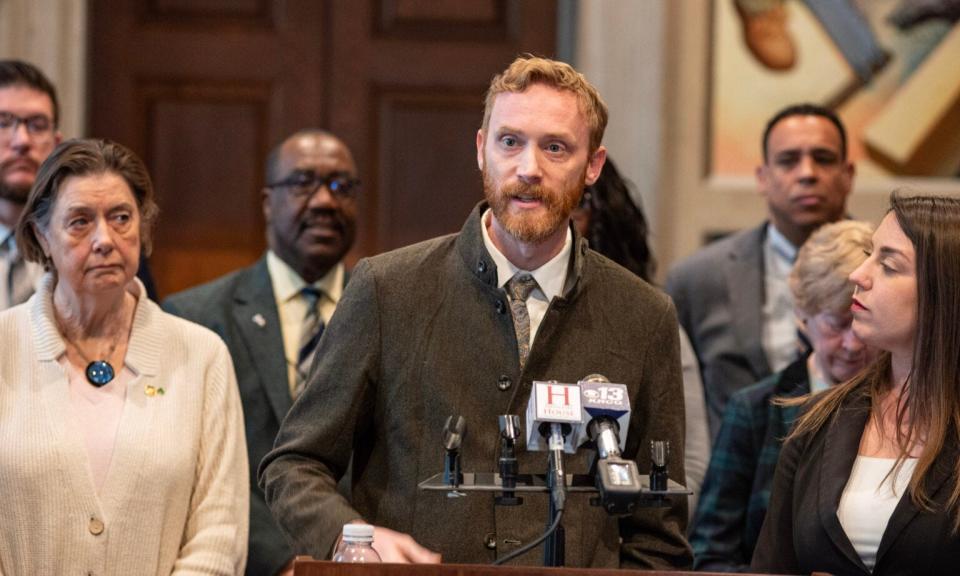Missouri lawmakers advance bill shielding pesticides like Bayer's Roundup from lawsuits
Legislation that critics allege would shield Bayer from additional lawsuits claiming that its weedkiller, Roundup, causes cancer has made speedy progress through the Missouri General Assembly.
House Bill 2763, sponsored by Rep. Dane Diehl, R-Butler, passed in the Missouri House on April 24, with a vote of 91-57, receiving a public hearing in the Senate Agriculture, Food Production and Outdoor Resources committee on April 30.

HB 2763 was scheduled to be voted on by the Senate committee Thursday, but a record breaking 40-hour filibuster in the Senate resulted in the cancellation of the committee meeting. As of Thursday, the committee hearing hadn’t been rescheduled yet.
The fast-tracked bill has a chance of passing this session, if Senate dysfunction doesn’t prevent further progress. A similar bill, Senate Bill 1416, stalled after passing in a Senate committee but never being debated by the full Senate.
The legislation would shield pesticides from lawsuits for failing to warn consumers that the product could cause cancer, so long as the product is approved and abides by labeling regulations put forth by the U.S. Environmental Protection Agency.
"In this industry, any pesticide used has gone through the full regulatory process and has thus been deemed safe to use,” Diehl said. “This piece of legislation protects products available now and that will be made available in the future. This legislation will help provide the tools needed currently and far into the future to provide sustainability to this industry."
The main ingredient in Roundup weedkiller is glyphosate, which some studies have identified as a carcinogen, but the EPA has continued to say is not harmful to people when used as directed.
However, Bayer has faced numerous lawsuits alleging that the weedkiller caused non-Hodgkin’s lymphoma. Although the company disputes these claims, it has been unsuccessful in many of the cases and has been forced to pay more than $10 billion based on the lawsuits.
Bayer ramps up lobbying efforts
While not specifically worded to protect only Bayer and its product, lobbyists representing the company have been vocal about passing this legislation, speaking in favor of it in committee hearings and visiting legislators in their offices.
According to reporting by the Associated Press, nearly identical legislation has also been introduced in Iowa and Idaho, and Bayer’s lobbying team in Missouri grew from four to nine people advocating for the passage of this legislation.

However, House Minority Leader Crystal Quade, D-Springfield, said that she has "definitely had more visits to my office as minority leader on this topic than I normally would” — from voices on both sides of the argument.
The Missouri Association of Trial Attorneys has been outspoken against the legislation on grounds that it hampers the ability for affected parties to have their constitutional right to a trial by jury on grounds that they believe the use of these products caused their cancer to develop.
Diehl dismissed this notion, arguing during the debate in the Missouri House that, “I think there could still be claims brought forward.”
Former Missouri House speaker Catherine Hanaway, who is now an attorney at Husch Blackwell representing Bayer, said that this legislation will simply provide consistency in product labeling, but the criticism that it will stop future lawsuits is “simply not true.”
Hanaway continued to refute the studies that said glyphosate causes cancer, saying that far more studies have not proven it to be a carcinogen. Although some courts have ruled against Bayer, she said that the reason for this is that the company “was not able to fully and accurately tell the jury the current scientific and regulatory landscape surrounding glyphosate.”
“Bayer has won far more of those lawsuits than it has lost and even when it has lost and the jury awards go up on appeal, they are reduced by 90%,” Hanaway said. “But going through that litigation process and having this patchwork of labeling requirements has cost this company billions of dollars, even when there's consistent scientific consensus that glyphosate does not cause cancer.”
Radio advertisements have been playing on Missouri stations that challenge listeners to ponder whether farmers or trial lawyers know what’s best for farming practices. The ads notably do not mention Bayer, pesticides or cancer allegations. State Rep. Adrian Plank, D-Columbia, feels that these advertisements are misleading.
“These pesticides and the company behind this legislation has been dishonest with our farmers for years. We can hear it in their ads. We can see it on their billboards,” Plank said. “These pesticides have had a devastating effect on my district, and the cost to those folks in my district with the medical issues that they've had over the years and the farming practices that have been devastated by it have been astronomical.”
House Speaker Dean Plocher, R-Des Peres, feels that any product that passes federal regulatory standards has done enough to ensure it is safe for use.
More: Pleasant Hope meatpacker halts operations amid search for wastewater disposal alternatives
“These industries are heavily regulated at the federal level, and to the extent labeling requirements are already imposed at the federal level, imposing different product labeling requirements is, at best, redundant and, at worst, confusing,” Plocher said. “This bill promotes consumer information and public health by encouraging manufacturers to register their pesticides with the United States Environmental Protection Agency.”

However, state Rep. Peter Merideth, D-St. Louis, argues there are other motivations at play.
“The fact is they're trying to protect Bayer. They're also trying to protect any other foreign corporation that comes in with a pesticide that they sell to us in the future from actually having to pay damages to people that die in our state from cancer,” Merideth said. “It's really not any more complicated than that. They want to limit the payouts to people dying of cancer from massive corporations that are preying on them and deceiving them.”
Supporters say bill protects national food security
The bill’s sponsor argues it is about more than protecting agricultural practices and that national security is at stake.
“If we continue down the road that we are right now, this is going to become a national security issue, because what's going to happen is China is going to be able to control the flow of this product worldwide,” Diehl said.
This is a point supported by Jeremy Hunt, a former U.S. Army intelligence captain and a national security expert at the Hudson Institute. Hunt said that 70% of current pest protection products are produced by Chinese companies controlled by the Chinese Communist Party, and allowing them a larger market share in that industry would put food security in the U.S. at risk.
“When you look at our food security and our overall food supply lines, we want to make sure that we have all the products and resources, the key input that our agriculture community depends on,” Hunt said. “We want to make sure those key inputs are built and can be produced here in the United States. We don't want to be reliant on foreign countries and certainly not our key adversary, like China.”
He feels that if China controls a vast majority of the market, the country could hike prices to unreasonable levels or produce products that are harmful and unregulated. Hunt supports regulating pesticide products, and says that this legislation would still allow for that to happen.
“We aren't saying no regulation at all,” Hunt said. “We're just saying we have an EPA that is designed specifically for regulating these types of products, and if you have a product that's registered with the federal government, registered with the EPA, it has already assessed the product and has approved it, then that should be enough in terms of warning to the public.”
However, Amy Goodman, president of the Missouri Association of Trial Lawyers, the group posing the strongest opposition to this legislation, said that Chinese companies are already selling products being purchased by the U.S., such as the herbicide paraquat, and passing this bill would only place those products under the same kind of protection.
“It shouldn't be a surprise that this bill will immunize that company as it continues to sell paraquat in the United States of America,” Goodman said. “I don't think that should be overlooked. In addition, paraquat causes Parkinson's disease and it has been banned by China since 2020.”
This article originally appeared on Springfield News-Leader: Critics: Missouri bill could shield Bayer from future Roundup lawsuits

